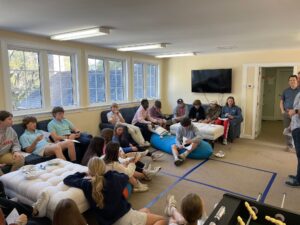Discipling Youth to Live Out Their Callings
AMIA Communications
 “My assumption is that if these students have made commitments to Jesus Christ, they are Christians, and therefore they have a calling, and they have ways that they need to grow,” says Percy Strickland, Associate Rector at the Abbey at Pawley’s Island. “They have a real work to do.”
“My assumption is that if these students have made commitments to Jesus Christ, they are Christians, and therefore they have a calling, and they have ways that they need to grow,” says Percy Strickland, Associate Rector at the Abbey at Pawley’s Island. “They have a real work to do.”
It’s a mindset that has guided him throughout over two decades of youth ministry. “I’ve always had a passion to see youth discipled, which started pretty early, probably even when I was in college.” After graduating from Duke University, Percy worked for InterVarsity Christian Fellowship and then with CHAT (now named Rise Richmond), a ministry to inner city youth, serving as CEO for almost 18 years. During this time, he and his wife also planted a multiethnic church.
Then God led him and his family to South Carolina, to Anglicanism and eventually to the Abbey at Pawley’s Island. There, he and his team seek to disciple a group of about 80 middle and high school students, helping them become fuller participating members of the church. “We have an inordinate number of youth in our church for the size of our church. And I think that’s just simply because we value them and we think they’re meaningful,” Percy says. “I think in a lot of church settings we love to have them, but for the most part, we see them as being in the way. … We underestimate [young people’s] capacity to understand the gospel and to be involved in ministry.”
As Percy has seen, age is not necessarily an indicator of spiritual maturity. He points out that people in the Church would be uncomfortable with Timothy: “Paul leaned on someone who was probably in his late teens to be leading congregations and discipling other people. And I think that’s why he had to write letters to Timothy because I think it was probably hard for Timothy to get respect in a lot of these places.”
Valuing students at the Abbey involves both intentional discipleship and giving them real opportunities to serve and be involved in the life of the church. This includes equipping high school students as small group leaders for middle schoolers and running an internship program to help college students, and in some cases high school students, live out their callings. “We coach them, mentor them and walk alongside them as they see the pitfalls and mistakes that happen as you enter into ministry and help them better clarify the unique way that they are articulated and built for ministry.”
Young people also gain ministry experience through the Abbey’s family worship service. Percy explains that because of Anglicanism’s use of tools like prayer books, teens can get involved in much of the service simply through reading. “Why not allow these guys to get the experience of reading a prayer or reading Scripture more regularly or doing all of these other things?” he proposes. “We say this every service: ‘This is more about participation than performance. It’s more about formation than formality.’”
Percy shares the example of a young guitar player who’s been involved in the worship team for the past year. “He has grown tremendously by learning to be up there and by fully participating in the worship team. … He’s being given an opportunity in that setting to really be able to grow and learn in real time, and also to just get used to being a part of offering his gifts in that way. And that’s the goal: to multiply opportunities for these guys to participate. … If we’re going to baptize them and we’re going to confirm them, then we’d better create spaces for them to use their gifts and to use them well.”
Many of the students at the Abbey become leaders in campus organizations like Fellowship of Christian Athletes, and Percy comes alongside them to disciple and help them in these roles. Several times, the Abbey has hosted an outreach event called Fields of Faith at the local high school, led almost entirely by students. Approximately 600 people attended the most recent event and heard students give their testimonies and lead worship on the football field.
 This approach is intentionally different than many popular conceptions of church programs for teens. “Youth ministry has been broken for about 30 or 40 years. … We’ve adopted an entertainment model instead of a training model,” Percy says. He then clarifies, “That doesn’t mean we [at the Abbey] don’t do fun things. … But the fun things are tools [primarily] to provide an opportunity for youth disciples to be able to live into their calling.” So, things like pizza parties, bowling outings and camps are just small parts of a bigger purpose of discipling students.
This approach is intentionally different than many popular conceptions of church programs for teens. “Youth ministry has been broken for about 30 or 40 years. … We’ve adopted an entertainment model instead of a training model,” Percy says. He then clarifies, “That doesn’t mean we [at the Abbey] don’t do fun things. … But the fun things are tools [primarily] to provide an opportunity for youth disciples to be able to live into their calling.” So, things like pizza parties, bowling outings and camps are just small parts of a bigger purpose of discipling students.
Relationships are key to this discipleship. “We need to have a level of intentionality, not just to offer events, but to develop,” Percy states. “We need to have communities of people in our congregation, and that includes parents, who are saying, ‘You know what? We’re just going to be unabashedly for these youth. … We’re going to break bread with them. We’re going to invite them to church. We’re going to invite them into small groups with leaders that are really showing themselves leaders. … We’re going to invite them into one-on-one discipleship relationships, either with older teens or with adults who just want to encourage them.”
For the many students who will enter settings where they will receive very different messages about identity, this is an incredibly powerful experience. As Percy has seen over his 24 years of running internship programs, young people who are given opportunities to use and develop their gifts in ministry continue to serve the Lord as they step into adulthood. “They’re becoming leaders in college. They lead worship there. … They step into [Christian campus organizations] because they value community. They value an ongoing relationship with Jesus, and they think they have a mission because they do.”
Getting teens involved in discipleship and ministry training is something any church can do even if they don’t have a youth program. Percy encourages churches that “The kind of fruit that would produce over a lifetime would just be incredible.”
“[Youth] have a chorus of people who are telling them what they’re not great at or how bad millennials or Gen Z are.” But, Percy says, within the local body of Christ, teens are able to “stand in a room of people and look out and say, ‘These people are for me. They’re praying for me. They want me to flourish. …They want to see me grow and develop, and they’re willing to invest in that.’ And I think that’s what we as a church have to do.”











